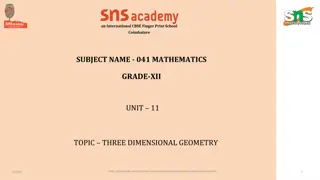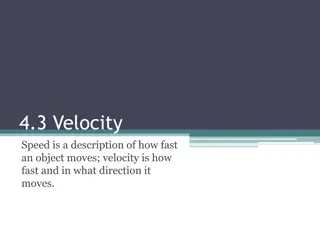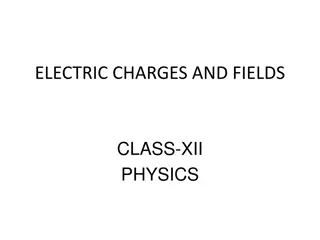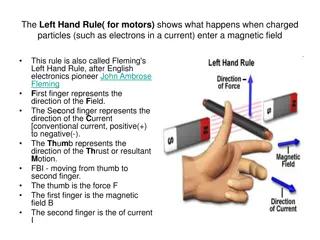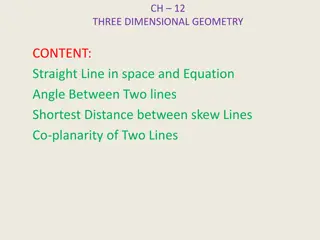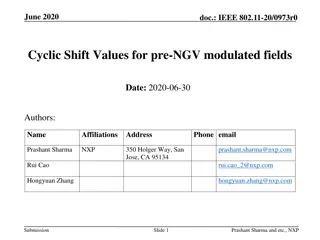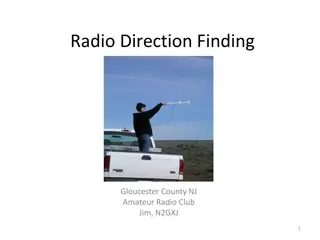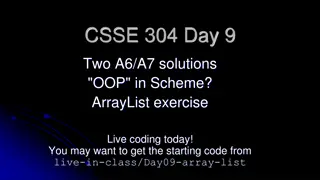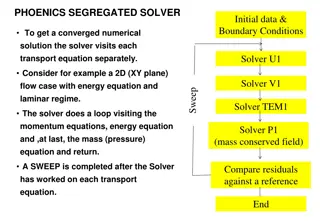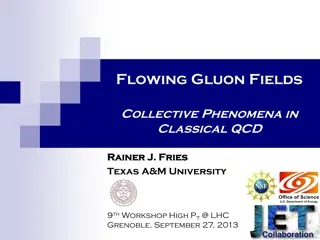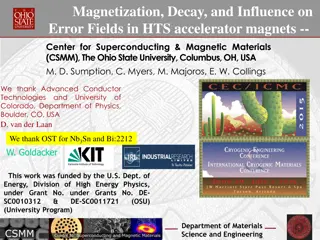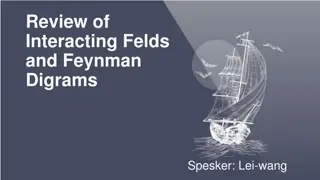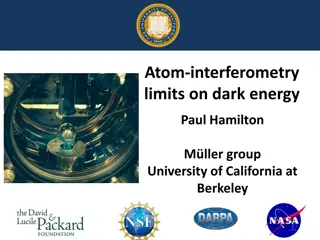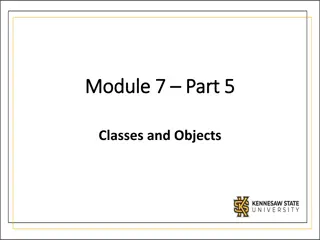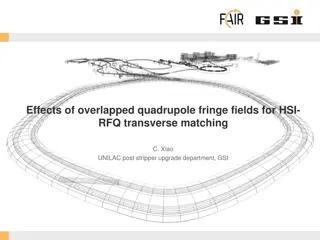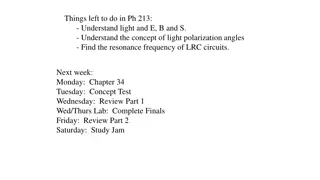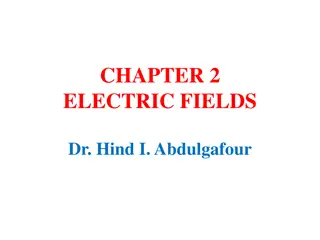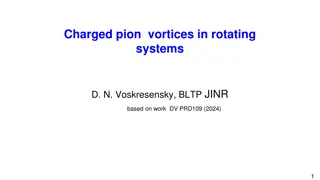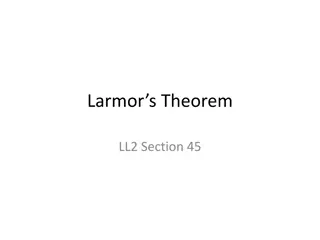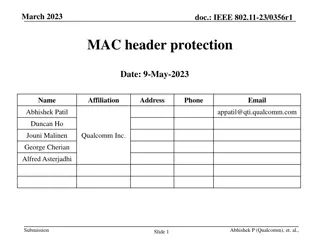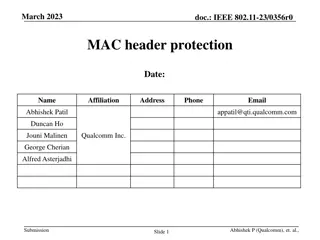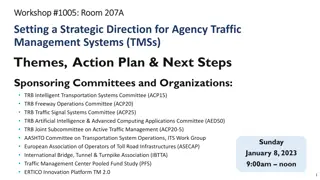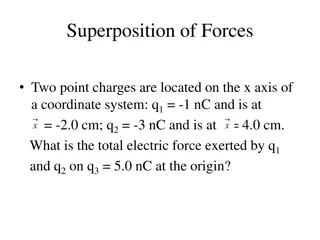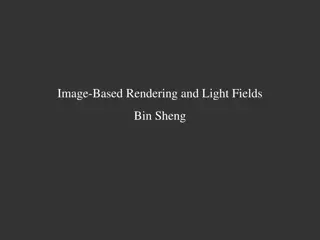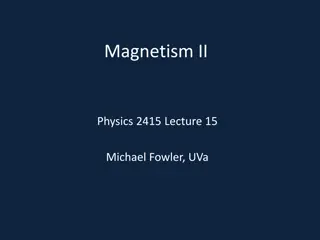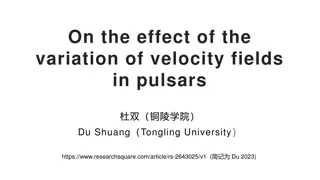Scale Based Regulation 2023 - Non-Banking Financial Company (NBFCs)
On October 19, 2023, the Reserve Bank of India (\u201cRBI\u201d) has issued \u2018Master Direction \u2013 Reserve Bank of India (Non-Banking Financial Company \u2013 Scale Based Regulation) Directions 2023\u2019 (\u2018SBR Master Direction\u2019). The SBR Master Direction aims to harmonize the Previ
0 views • 9 slides
Understanding Ampere's Law and Magnetic Fields in Wires
Explore the basic premise and elementary applications of Ampere's Law in calculating magnetic fields around wires. Learn how to determine the magnetic field strength at various distances from a wire carrying current, and comprehend the force between two parallel wires due to magnetic fields. Dive in
7 views • 11 slides
Basic Principles of MRI Imaging
MRI, or Magnetic Resonance Imaging, is a high-tech diagnostic imaging tool that uses magnetic fields, specific radio frequencies, and computer systems to produce cross-sectional images of the body. The components of an MRI system include the main magnet, gradient coils, radiofrequency coils, and the
2 views • 49 slides
Understanding Date Fields in Contract Management Systems
Contract management systems often have specific date fields that serve different purposes. Effective Dates, Period of Performance Start Dates, and Completion Dates all have unique functions and must be accurately reported in systems like FPDS. It is crucial to understand the differences between thes
3 views • 7 slides
Understanding Three-Dimensional Geometry Concepts in Mathematics
Explore the concepts of three-dimensional geometry in mathematics, including direction angles, direction cosines, direction ratios, and equations of lines in space. Learn how to find direction cosines and ratios of a line and understand the properties of X, Y, and Z axes. Gain insights into the uniq
1 views • 15 slides
Exploring Magnetic Fields and Earth's Magnetism
Uncover the fascinating world of magnetic fields, from the historical discoveries of magnetism to understanding the Earth's magnetic field and its poles. Dive into the concepts of magnetic forces, field lines, and the direction of Earth's magnetic field over time. Discover the properties of magnetic
1 views • 24 slides
Understanding Velocity vs. Speed in Physics
Velocity and speed are fundamental concepts in physics that describe how fast an object is moving and in what direction. While speed is a scalar quantity representing the rate of motion, velocity is a vector quantity that includes both speed and direction. Constant velocity implies steady speed and
0 views • 8 slides
Understanding Electric Charges and Fields in Physics
Electrostatics is the study of forces, fields, and potentials arising from static charges, including positive and negative charges which interact based on the principles of like charges repelling and unlike charges attracting. By convention, electrons are considered negative, while protons are posit
0 views • 12 slides
Understanding Magnets and Magnetic Fields
Explore the fascinating world of magnets and magnetic materials. Discover how magnets have two poles, North and South, and how they interact with each other. Learn about magnetic materials like iron, cobalt, and nickel, and understand the concept of magnetizing and demagnetizing. Dive into the magne
0 views • 15 slides
Magnetic Field Problems: Protons, Wires, and Charged Ions
Solve various problems related to magnetic fields, including determining forces on protons, calculating magnetic forces on wires with currents, finding the radius of paths for charged ions in magnetic fields, and more. Understand concepts such as magnetic forces, circular orbits, and interactions be
0 views • 10 slides
Understanding Fleming's Left Hand Rule and Electric Motors
Fleming's Left Hand Rule, also known as the Left Hand Rule for Motors, explains the interaction between charged particles and magnetic fields. Electric motors utilize this principle to convert electrical energy into mechanical energy through the interaction of magnetic fields and current-carrying co
2 views • 6 slides
Three-Dimensional Geometry: Direction Cosines and Angles
Understanding direction cosines and angles in three-dimensional geometry is crucial for determining the orientation of lines in space. By calculating direction cosines, we can find the angles a line makes with the positive directions of the X, Y, and Z axes. This knowledge helps in various geometric
0 views • 18 slides
Understanding Electric Field Lines and Charges
Electric field lines provide a visual representation of the electric field around charges. They show the direction of the electric field and help understand the intensity of the field at different points. Field lines never cross each other and the tangent at any point on a line gives the field direc
0 views • 40 slides
IEEE 802.11-20/0973r0 Cyclic Shift Values for Pre-NGV Modulated Fields
Introduction to the determination of cyclic shift values for pre-NGV modulated fields in the IEEE 802.11-20/0973r0 document. The proposal suggests using existing values defined for pre-VHT, specifically for L-STF, L-LTF, L-SIG, and VHT-SIG-A fields of the PPDU. References and a straw poll are also i
2 views • 5 slides
Fascinating World of Radio Direction Finding (RDF) Through History
Explore the intriguing world of Radio Direction Finding (RDF), an essential technique for determining the direction of radio signals. From its origins with Heinrich Hertz in 1888 to its pivotal role in military operations during WWI and WWII, RDF technology has evolved over the years while still rel
9 views • 23 slides
Exploring Object-Oriented Programming in Scheme
The content discusses implementing object-oriented programming concepts in Scheme, focusing on encapsulation through fields and methods. It explores representing objects and manipulating fields exclusively through methods. The tutorial covers creating objects, defining methods, and accessing fields
2 views • 13 slides
Efficient Solver Techniques in CFD Simulations
This resource provides insights into the segregated solver approach in computational fluid dynamics (CFD) simulations, specifically focusing on the sweeping direction and its impact on computational efficiency and convergence rates. It discusses the benefits of employing the XY plane for 2D cases to
0 views • 50 slides
Understanding Flowing Gluon Fields and Color Glass Phenomena in QCD
Explore the collective phenomena of gluon fields in classical QCD, focusing on the Standard Model of URHICs, Color Glass, and Gluon Fields in the Forward Lightcone. The research delves into topics like local thermal equilibrium, viscous hydrodynamics, and the interaction of probes with quarks and gl
0 views • 24 slides
Data Warehouse Student User Group Meeting Updates March 20, 2019
Updates from the Data Warehouse Student Data Users Group meeting on March 20, 2019 include repurposed course inventory fields, addition of new military-affiliated student fields, and changes in Curriculum Management system functionality. Key changes involve labeling and retirement of certain data el
1 views • 16 slides
Magnetization, Decay, and Error Fields in HTS Accelerator Magnets
The research conducted at The Ohio State University focuses on understanding the magnetization, decay, and influence of error fields in high-temperature superconducting (HTS) accelerator magnets. The study explores the impact of different superconducting materials such as Nb3Sn, YBCO, and Bi:2212 on
0 views • 21 slides
Understanding Interacting Fields and Feynman Diagrams in Quantum Field Theory
Delve into the fascinating world of quantum field theory with a focus on interacting fields and Feynman diagrams. Explore perturbation theory, correlation functions, Wick's theorem, and Feynman diagram rules to gain insights into preserving causality, calculating two-point correlation functions, and
0 views • 18 slides
Understanding Classical Mechanics and Fields in Physics
Explore the concepts of radiation, matter, fields, Hamiltonian, and more in classical mechanics with a focus on velocity-dependent potentials and conservative systems. Dive into the detailed discussions on gauge theory, Coulomb gauge, magnetic fields, and Hamiltonian operators within the framework o
0 views • 28 slides
Limits on Dark Energy Using Atom Interferometry - UC Berkeley Study
Research conducted by Paul Hamilton Müller's group at the University of California, Berkeley, focuses on using atom interferometry to explore dark energy. The study delves into screened scalar fields as dark energy, future reach with atom interferometry, known unknowns related to dark energy densit
0 views • 39 slides
Understanding Classes and Objects in Python and Java
Python and Java both utilize classes and objects in their programming paradigms. While there are syntax differences, the fundamental concepts remain similar. Fields and constructors are key components in defining classes, with Python using shared fields until assignments are made and Java focusing o
1 views • 6 slides
Higher-Form Gauge Fields and Membranes in D=4 Supergravity
This study focuses on higher-form gauge fields and membranes in D=4 supergravity, exploring their role in cosmological constant generation and membrane nucleation. The dynamics of three-form gauge fields, their coupling to gravity and membranes, and implications for cosmological models and supersymm
0 views • 17 slides
Investigation of Overlapped Quadrupole Fringe Fields for HSI-RFQ Transverse Matching
General introduction to the study on quadrupole fringe fields, focusing on investigating the effects of overlapped fringe fields on HSI-RFQ transverse matching by introducing a new QQ focusing system and measuring transmission efficiency with comparisons between simulations and experiments. The stud
0 views • 17 slides
Tidal Deformability of Compact Stars Admixed with Scalar Fields Research Summary
Researchers like C. J. Horowitz and Kwing-Lam Leung are exploring the effects of dark matter, scalar fields, and ultra-light dark matter on compact stars like neutron stars. Methods involve calculating tidal love numbers, using energy-momentum tensors, and studying equilibrium solutions. The study a
0 views • 20 slides
Statistical Analysis of Solar Magnetic Fields from Hinode/SOT SP Data
Statistical analysis was conducted on solar magnetic fields using data from the Hinode/SOT SP and ground-based telescopes. The study examined current helicity, magnetic twists, and helical parameters, revealing hemispheric sign rules and variations based on field strengths. Results show different he
0 views • 13 slides
Understanding E and B Fields in Physics 213
Explore concepts such as light polarization angles, resonance frequency of LRC circuits, Lorentz Force Law, Gauss Law, Faraday's Law, and Ampere-Maxwell Law in Physics 213. Delve into the interplay between electric and magnetic fields, and their effects on charged particles such as electrons and pro
0 views • 19 slides
Understanding Electric Fields: Fundamentals and Concepts
Electric fields are created by surrounding charges and are represented by vectors indicating the force experienced by a test charge. Electric field lines help visualize the direction and strength of the field, with denser lines indicating stronger fields. The electric field due to a point charge can
0 views • 13 slides
Charged Pion Vortices in Rotating Systems: Insights and Consequences
This study explores the intriguing phenomenon of charged pion vortices in rotating systems, discussing their potential appearance in various scenarios, the role of angular momentum, and the manifestation of supervortices. Analysis includes the impact of static electric fields, distribution of vortic
0 views • 24 slides
Understanding Larmor's Theorem and Lagrangian Formulation in Electromagnetic Fields
Explore Larmor's Theorem, time-averaged forces, torques, and Lagrangian formulations for systems of charges in electromagnetic fields. Dive into the comparison with electric dipoles, transformation to rotating frames, and Lagrangian analysis for closed systems with finite motions. Uncover the intric
0 views • 13 slides
Understand Magnetic Fields and Currents in Solids
Explore the concepts of magnetic fields and currents in solids, including the calculation of magnetic dipole moments, the presence of bound currents in cylinders with uniform magnetization, the distribution of bound currents on different surfaces, and the behavior of magnetic fields in solid cylinde
0 views • 14 slides
Vulnerabilities in Unprotected MAC Header Fields in IEEE 802.11 Standard
The document discusses the risks associated with unprotected fields in the MAC header of MPDUs in IEEE 802.11 standards, highlighting how these fields can be vulnerable to attacks leading to adverse effects on receivers. Fields like Frame Control, Sequence Control, and QoS Control are identified as
0 views • 10 slides
Enhancing MAC Header Protection in IEEE 802.11 for Improved Security
Numerous critical fields in the MAC header of IEEE 802.11 frames lack protection during encryption, making them vulnerable to attacks that can have adverse effects on receivers. By safeguarding these fields, performance goals can be met, power efficiency enhanced, and reliability improved. The docum
0 views • 9 slides
Strategic Direction for Agency Traffic Management Systems Workshop
Workshop #1005 in Room 207A focused on setting a strategic direction for Agency Traffic Management Systems (TMSs) with sponsoring committees from various organizations. The workshop discussed opportunities to consider TMS strategic direction, improvements, and resource needs in agency processes and
0 views • 10 slides
Electric Charges and Fields in Physics
Explore topics such as superposition of forces, electric fields, particle interactions, potential differences, and cathode-ray tube concepts in physics involving charges, forces, and fields. Understand scenarios like calculating total electric force between charges, finding electric fields at specif
0 views • 10 slides
Understanding Image-Based Rendering and Light Fields
Exploring the concepts of Image-Based Rendering (IBR) and Light Fields through a historical perspective, pros and cons analysis, basic approaches, and recent developments in the field. IBR offers photorealistic image capture and representation, with advancements like data-driven graphics and appeara
0 views • 43 slides
Understanding Magnetism: Forces, Fields, and Applications
Explore the fascinating realm of magnetism in Physics as you delve into topics such as forces on charged particles, path of particles in magnetic fields, torque on current loops, and Earth's magnetic field alignment. Learn about the force on straight wires and electric charges in magnetic fields, an
0 views • 14 slides
Impact of Velocity Field Variations on Pulsar Magnetic Fields
The study explores how variations in velocity fields affect pulsar magnetic fields, highlighting the conversion of kinetic energy to magnetic energy in pulsars. Glitches in these systems can lead to changes in magnetic fields, influencing pulsar emissions. The maintenance of stable magnetic fields a
0 views • 14 slides




